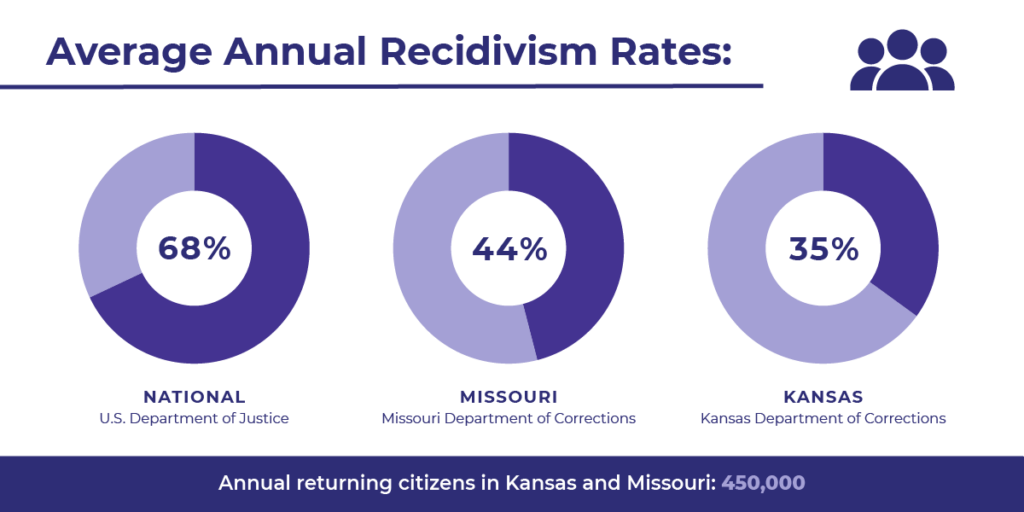According to the Prison Policy Initiative, Kansas and Missouri together release around 450,000 individuals from their prisons and jails each year. More specifically, at any time, there are nearly 1,000 individuals in Jackson County’s prisons and jails. These numbers are unsustainable on both local and state levels.
As formerly incarcerated individuals reenter the community, it is imperative that we set them up for success and provide as much support as possible to reduce the recidivism rate—the rate at which formerly incarcerated individuals reenter the prison system—not only for the health of our prisons and jails, but for our economy, safety, culture and for the success of each individual reentering Kansas City. According to the Missouri Department of Corrections, the state’s current recidivism rate is 44% for ex-offenders within three years of reentry.
Community reentry preparation and comprehensive support services are essential for the successful reintegration of formerly incarcerated individuals. These services provide crucial resources and guidance, including job training, education, housing assistance, substance abuse treatment, and mental health support. By addressing these fundamental needs, individuals are better equipped to overcome challenges and lead productive, law-abiding lives.
The benefits of community reentry preparation and support services extend beyond the individual to the community as a whole. When formerly incarcerated individuals successfully reintegrate into society, they are less likely to re-offend, reducing crime rates and enhancing public safety.

Data-Focused Reentry Support
Reentry programs use evidence-based approaches to prepare ex-offenders for successful reintegration into the community, focusing on reducing recidivism and fostering prosocial behavior.
Workforce Development
Workforce development programs are another crucial component of reentry preparation. These programs address the significant barrier to successful reentry posed by unemployment. They often include vocational training, job readiness workshops, and assistance with job placement. Participants may learn marketable, in-demand skills, such as carpentry, welding, or computer programming, increasing their employment prospects upon release.
Workforce development programs also focus on soft skills, including resume writing, interviewing techniques, and workplace etiquette, which are essential for securing and maintaining employment. By providing ex-offenders with the tools and support they need to find stable employment, these programs reduce the likelihood of recidivism driven by economic necessity. 
Cognitive Behavioral Intervention
Another core approach is Cognitive Behavioral Intervention (CBI). CBI aims to identify and modify maladaptive thought patterns and behaviors that contribute to criminal activity. In correctional settings and community-based programs, therapists use CBI techniques to help individuals recognize triggers for criminal behavior, develop coping mechanisms for high-risk situations, and practice alternative, prosocial responses.
For example, a CBI group might focus on anger management, teaching participants to recognize the physical and emotional signs of escalating anger and practice de-escalation techniques like deep breathing or assertive communication. This approach recognizes that criminal behavior is often learned and can be unlearned through targeted interventions.
Addressing Substance Abuse and Mental Health
Persistent and pervasive substance abuse and mental health issues are often a contributing factor in the likelihood of recidivism. Many individuals within the correctional system struggle with substance use disorders or mental health conditions that contribute to their criminal behavior. Integrated treatment approaches, combining individual and group therapy, medication management (when necessary), and peer support, are often implemented both within correctional facilities and in community-based aftercare programs.
These programs aim to address the underlying issues that fuel substance abuse and mental health problems, equipping individuals with coping strategies and relapse prevention skills. Connecting individuals with community-based mental health and substance abuse services upon release is crucial for ongoing support and stability.

Kansas City Reentry Programs
Returning Citizens Career Campus at Lansing Correctional Facility
The vision of Returning Citizens Career Campus at Lansing Correctional Facility is to transform the corrections system and justice system, fostering an environment of hope and opportunity for returning citizens. It does this by training incarcerated individuals, preparing them to enter the workforce upon release, providing them with the credentials they’ll need for work in high demand industries.
Contact Lansing Correctional Facility Career Center
Second Chance
The Second Chance Risk Reduction Center is a program of the Kansas City Metropolitan Crime Commission. It provides services for people reentering society after previous involvement with the justice system including cognitive behavioral intervention, peer support group, employment support and conflict resolution training.
The Second Chance Risk Reduction Center has 14 years of experience working with the Missouri Department of Corrections to deliver intentional and high-quality reentry services, as well as more than 10 years experiences in delivering reentry employment services, boasting a track record of successful employment and recidivism reduction outcomes.
Second Chance program graduates have an active recidivism rate of less than 5%, compared to the State of Missouri’s 44% and the national average 65%.
“99% of Missourians who are in the justice system will reenter. These people are family members, CEOs, homeless people, addicts and everything between. Supporting this population is essential for community building and violence reduction.” – Brittany Peterson, Lead Resources Specialist with Second Chance
Missouri Department of Corrections Office of Reentry Services
The Missouri Department of Corrections (MoDOC) Office of Reentry Services helps coordinate wrap-around services for Missourians preparing to reenter the community. The office partners with organizations and agencies to help those leaving prison find housing, clothing, food, transportation, medical care, childcare, substance use treatment, education, spiritual support and other resources they need to succeed.
They work directly with these community organizations to bring their services and advisors into the prisons to develop meaningful connections that they will retain when they are back in the community. They also work with local businesses to match ex-offenders with employment opportunities.
How You Can Support Reentry
Kansas Citians play a crucial role in supporting successful reentry programs for formerly incarcerated individuals. By challenging pervasive stigmas surrounding ex-offenders, volunteering with organizations and participating in employment programs, we can make a difference as community members in the lives of ex-offenders.
Addressing Stigmas
Ex-offenders are often seen as dangerous, undesirable members of a community. That could not be further from the truth. By sharing success stories of successful reentry, highlighting the challenges faced by returning citizens, and emphasizing the potential for rehabilitation within our own social circles, we can shift public perception.
Donate your Time
Volunteering time with reentry organizations, mentoring returning citizens, or simply advocating for fair chance hiring practices are all tangible ways to contribute to a more inclusive and supportive environment. By recognizing the inherent worth and potential of every individual, regardless of their past, Kansas City can foster a community that embraces second chances.

Business Involvement
Many returning citizens struggle to find employment, a critical factor in successful reintegration. Businesses can adopt fair chance hiring policies and partner with reentry programs as a potential employer. For residents, supporting businesses that actively hire ex-offenders sends a powerful message about the value of second chances and creates economic opportunities that benefit the entire community.
Recidivism is one of many contributing factors to Kansas City’s violent crime crisis. To make our community safer for all Kansas Citians, we need to support those who are at the highest risk of crime involvement. By supporting reentry programs, we are taking another step towards a safer Kansas City for all.



